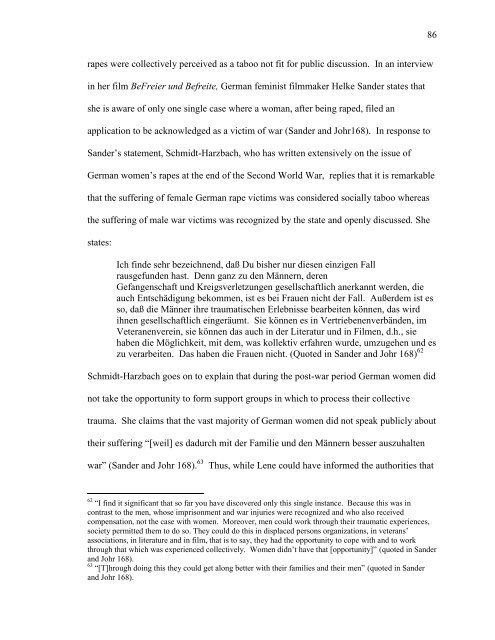'Murderer's House' - University of Victoria
'Murderer's House' - University of Victoria
'Murderer's House' - University of Victoria
You also want an ePaper? Increase the reach of your titles
YUMPU automatically turns print PDFs into web optimized ePapers that Google loves.
apes were collectively perceived as a taboo not fit for public discussion. In an interview<br />
in her film BeFreier und Befreite, German feminist filmmaker Helke Sander states that<br />
she is aware <strong>of</strong> only one single case where a woman, after being raped, filed an<br />
application to be acknowledged as a victim <strong>of</strong> war (Sander and Johr168). In response to<br />
Sander‟s statement, Schmidt-Harzbach, who has written extensively on the issue <strong>of</strong><br />
German women‟s rapes at the end <strong>of</strong> the Second World War, replies that it is remarkable<br />
that the suffering <strong>of</strong> female German rape victims was considered socially taboo whereas<br />
the suffering <strong>of</strong> male war victims was recognized by the state and openly discussed. She<br />
states:<br />
Ich finde sehr bezeichnend, daß Du bisher nur diesen einzigen Fall<br />
rausgefunden hast. Denn ganz zu den Männern, deren<br />
Gefangenschaft und Kreigsverletzungen gesellschaftlich anerkannt werden, die<br />
auch Entschädigung bekommen, ist es bei Frauen nicht der Fall. Außerdem ist es<br />
so, daß die Männer ihre traumatischen Erlebnisse bearbeiten können, das wird<br />
ihnen gesellschaftlich eingeräumt. Sie können es in Vertriebenenverbänden, im<br />
Veteranenverein, sie können das auch in der Literatur und in Filmen, d.h., sie<br />
haben die Möglichkeit, mit dem, was kollektiv erfahren wurde, umzugehen und es<br />
zu verarbeiten. Das haben die Frauen nicht. (Quoted in Sander and Johr 168) 62<br />
Schmidt-Harzbach goes on to explain that during the post-war period German women did<br />
not take the opportunity to form support groups in which to process their collective<br />
trauma. She claims that the vast majority <strong>of</strong> German women did not speak publicly about<br />
their suffering “[weil] es dadurch mit der Familie und den Männern besser auszuhalten<br />
war” (Sander and Johr 168). 63 Thus, while Lene could have informed the authorities that<br />
62 “I find it significant that so far you have discovered only this single instance. Because this was in<br />
contrast to the men, whose imprisonment and war injuries were recognized and who also received<br />
compensation, not the case with women. Moreover, men could work through their traumatic experiences,<br />
society permitted them to do so. They could do this in displaced persons organizations, in veterans‟<br />
associations, in literature and in film, that is to say, they had the opportunity to cope with and to work<br />
through that which was experienced collectively. Women didn‟t have that [opportunity]” (quoted in Sander<br />
and Johr 168).<br />
63 “[T]hrough doing this they could get along better with their families and their men” (quoted in Sander<br />
and Johr 168).<br />
86

















